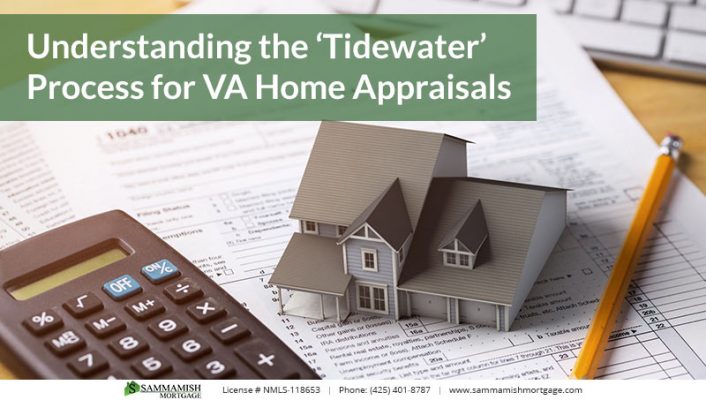No Obligation and transparency 24/7. Instantly compare live rates and costs from our network of lenders across the country. Real-time accurate rates and closing costs for a variety of loan programs custom to your specific situation.

The Tidewater process is an extra step that sometimes occurs with VA home appraisals. It is used in cases where the property appraises below the contract purchase price. Tidewater gives the VA-approved appraiser a way to request additional information that might support the sale price.
The Department of Veterans Affairs (VA) loan program is a popular financing option among military members and veterans in Washington and Oregon, the primary states we serve.
This program has specific requirements for both the borrower and the property being purchased. Among other things, a full home appraisal must be completed to determine the current market value of the property (as with most mortgage programs).
In some scenarios, the VA-approved home appraiser might use something known as the Tidewater initiative. This option allows the appraiser to request additional information that supports the sale price of the home. The Tidewater Initiative is used in cases where the home is appraised for less than the purchase/sale price.
Read more: VA home appraisal overview
Also referred to as the Tidewater policy or process, the Tidewater Initiative was created in 2003. The Department of Veterans Affairs implemented this policy to allow home appraisers to request additional sales information prior to the appraisal being completed.
There’s a misconception that the Tidewater policy, when invoked, could derail the VA loan process and stop the home sale in its tracks. But that’s actually the opposite of what it was designed to do.
When used correctly, this policy can actually help keep the transaction move forward. That makes it relevant to buyers, sellers, lenders and real estate agents who are involved with a VA-loan home sale in Washington or Oregon.
“Through the years, this process has assisted Veterans in attaining the home they desire. While housing data sources have improved, there are still times when relevant sales are not readily available via traditional data sources. Using the Tidewater process gives interested parties the opportunity to provide additional sales data that may support the contract price.”
In this context, the phrase “interested parties” could refer to the home seller, the listing agent, and even the lender. The Tidewater process allows these individuals to provide additional information (like comparable sales data) that might help to justify the sale price. The overriding goal is to keep the process on track, and to facilitate the sale of the home.
The Tidewater initiative/process is typically only used in cases where the appraisal comes in below the purchase price that the buyer and seller have agreed on. If the VA home appraiser believes that the property value might end up being short of the purchase price, he or she could invoke the Tidewater initiative. So it’s essentially a request for supporting information.
Read More: 5 Common Questions About Using a VA Loan
Note: This a basic overview of the steps involved in the Tidewater process for VA home appraisals in Washington and Oregon. There might be additional or fewer steps, depending on the situation.
Will you need mortgage financing to buy a home? We can help. Sammamish Mortgage has been serving buyers across the Pacific Northwest since 1992. We offer a wide variety of mortgage programs and products with flexible qualification criteria. Please contact us today with any financing-related questions you have.


Whether you’re buying a home or ready to refinance, our professionals can help.
{hours_open} - {hours_closed} Pacific
No Obligation and transparency 24/7. Instantly compare live rates and costs from our network of lenders across the country. Real-time accurate rates and closing costs for a variety of loan programs custom to your specific situation.